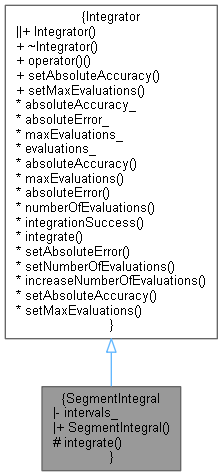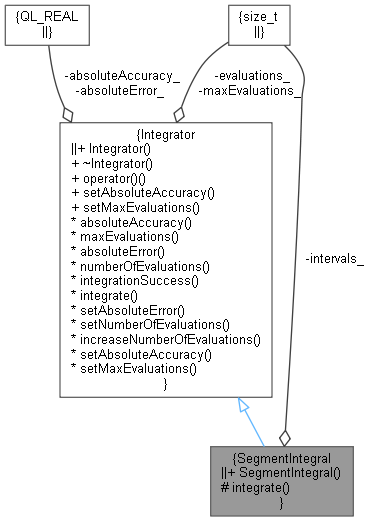Integral of a one-dimensional function. More...
#include <segmentintegral.hpp>
 Inheritance diagram for SegmentIntegral:
Inheritance diagram for SegmentIntegral: Collaboration diagram for SegmentIntegral:
Collaboration diagram for SegmentIntegral:Public Member Functions | |
| SegmentIntegral (Size intervals) | |
 Public Member Functions inherited from Integrator Public Member Functions inherited from Integrator | |
| Integrator (Real absoluteAccuracy, Size maxEvaluations) | |
| virtual | ~Integrator ()=default |
| Real | operator() (const std::function< Real(Real)> &f, Real a, Real b) const |
| void | setAbsoluteAccuracy (Real) |
| void | setMaxEvaluations (Size) |
| Real | absoluteAccuracy () const |
| Size | maxEvaluations () const |
| Real | absoluteError () const |
| Size | numberOfEvaluations () const |
| virtual bool | integrationSuccess () const |
Protected Member Functions | |
| Real | integrate (const std::function< Real(Real)> &f, Real a, Real b) const override |
 Protected Member Functions inherited from Integrator Protected Member Functions inherited from Integrator | |
| void | setAbsoluteError (Real error) const |
| void | setNumberOfEvaluations (Size evaluations) const |
| void | increaseNumberOfEvaluations (Size increase) const |
Private Attributes | |
| Size | intervals_ |
Detailed Description
Integral of a one-dimensional function.
Given a number \( N \) of intervals, the integral of a function \( f \) between \( a \) and \( b \) is calculated by means of the trapezoid formula
\[ \int_{a}^{b} f \mathrm{d}x = \frac{1}{2} f(x_{0}) + f(x_{1}) + f(x_{2}) + \dots + f(x_{N-1}) + \frac{1}{2} f(x_{N}) \]
where \( x_0 = a \), \( x_N = b \), and \( x_i = a+i \Delta x \) with \( \Delta x = (b-a)/N \).
- Tests:
- the correctness of the result is tested by checking it against known good values.
Definition at line 50 of file segmentintegral.hpp.
Constructor & Destructor Documentation
◆ SegmentIntegral()
|
explicit |
Definition at line 24 of file segmentintegral.cpp.
Member Function Documentation
◆ integrate()
|
overrideprotectedvirtual |
Implements Integrator.
Definition at line 64 of file segmentintegral.hpp.
 Here is the call graph for this function:
Here is the call graph for this function:Member Data Documentation
◆ intervals_
|
private |
Definition at line 57 of file segmentintegral.hpp.


